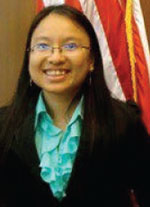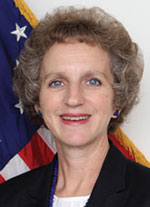Diversity in Diplomacy: The Mentoring Dimension
It is one thing to recruit a diverse workforce; it is quite another to sustain that diversity into the senior ranks and reap the benefits. Mentoring is one of the keys.
BY JENNIFER ZIMDAHL GALT AND THAO ANH TRAN
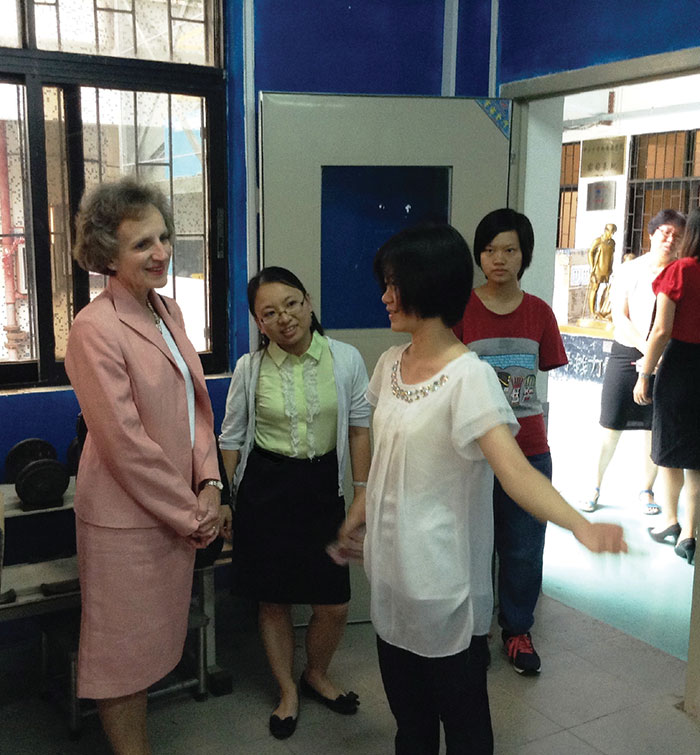
Consul General Galt and Thao Anh Tran tour the Guangzhou English Training Center for the Handicapped campus during a September 2014 visit to the school to promote education and disability rights in south China. CG Galt delivered a speech to kick off the new academic year; Thao Anh served as her control officer.
Public Affairs Section / U.S. Consulate General Guangzhou
Diversity in all its forms is important at every rank of the Foreign Service. As representatives of the United States, we should reflect our nation’s diversity, a core American value from which we draw our strength. A more diverse Foreign Service also will contribute to more effective foreign policymaking.
The different perspectives that come from embracing diversity can give the United States a kind of asymmetric advantage—the challenge is to leverage that advantage. We need and deserve an organizational culture that incorporates all types of diversity to assure new officers and specialists that they can aspire to successful careers in the Foreign Service.
It is no secret that the Foreign Service needs more diversity. According to the 2014 promotion statistics, gender and racial disparity persists in promotions and the gaps widen at the Senior Foreign Service level. From FS-4 to FS-3, promotion rates for men and women were roughly equal at 42.7 percent for men vs. 40.4 percent for women, whereas from OC to MC, only 23.9 percent of those promoted were women vs. 30.3 percent men. The pool of eligible minority candidates for promotion shrinks significantly at the higher ranks. From FS-1 to OC, of 379 who competed, only 49 were non-white and 127 were women. From MC to CM, only 29 non-whites vs. 132 whites and 44 women vs. 117 men competed for promotions.
We believe that a robust mentorship program is vital to achieving and sustaining greater diversity in the Foreign Service. The State Department’s advancements in recruiting minorities and ensuring equity across the diversity spectrum should be expanded to sustain diversity into the senior ranks. We propose embedding diversity into the mentoring program, and offer tips based on our own experience for how mentors and mentees can establish more fulfilling, diversity-focused partnerships.
A Diversity-Focused Mentoring Program: A Worthy Investment
The State Department’s formal mentoring program for members of the Foreign Service has three components: The first two provide structured mentoring for entry-level generalists and specialists; a third component allows mid-level professionals to request situational mentoring at a specific time to help quickly resolve problems. Mentors and mentees submit forms to the Bureau of Human Resources, and the Mentor Council pairs them up based on shared interests. Both mentor and mentee may dissolve the mentoring relationship at any time by mutual agreement.
A true partnership means understanding the diversity that each brings to the relationship.
A diversity-focused mentoring program has the power to alter participants’ behaviors for the better in terms of their ability to interact with a diverse group of people, process diverse ideas and internalize diverse values. It also provides members of underrepresented groups with career advancement paths in the Foreign Service. When managers mentor with a focus on diversity, they acquire a heightened awareness and become strong advocates for diversity across the department. We propose four changes to improve the program’s overall effectiveness and establish the vital connection between mentoring and diversity.
1. Make sustaining diversity a mentoring program goal. While the Thomas R. Pickering and Charles B. Rangel Fellowships are good first steps to help bring diverse minorities into the Foreign Service, formal and informal mentor-mentee partnerships can help sustain diversity beyond the recruitment stage. These partnerships enable both parties to reciprocate exchanges and to be included in each other’s networks, which will enhance and sustain diversity over time.
2. Formalize and strengthen the role of A-100 and specialist class mentors. During A-100 and specialist classes is the ideal time to discuss the role of mentorship and how entry-level officers (ELOs) and specialists can best engage with mentors for their mutual benefit. Class mentors should meet with each ELO and specialist individually or in small groups throughout their training. With a better understanding of the assistance mentors can provide, ELOs and specialists will be more likely to stay in touch and seek additional mentorship opportunities later in their careers. The department should guarantee that all ELOs and specialists will be assigned formal mentors on completion of initial training and before they take up their first assignments.
3. Mentor-mentee matching should be employee-driven rather than HR-directed. Instead of the Mentor Council pairing mentors and mentees, we propose that the program supply a list of short biographies of available mentors and allow mentees to decide which would be a good fit for them, possibly via SharePoint or another intranet site. Prospective mentees could search for available mentors, while mentors decide for themselves how many mentees they are able to provide guidance to at any point in time. Mentors and mentees could update the site following a successful match.
4. Provide incentives for mentoring. The Director General’s March 2015 cable notes that mid-level and senior officers are encouraged to include mentoring among their formal work requirements. We recommend extending this to all FS-1 and SFS officers and specialists, regardless of their positions. This would add depth to mentoring at posts where currently only the DCM or principal officer has formal mentoring responsibilities. We further recommend that the department develop a system of incentives to encourage officers and specialists to become mentors and to take their mentoring responsibilities seriously, particularly with regard to promoting diversity.
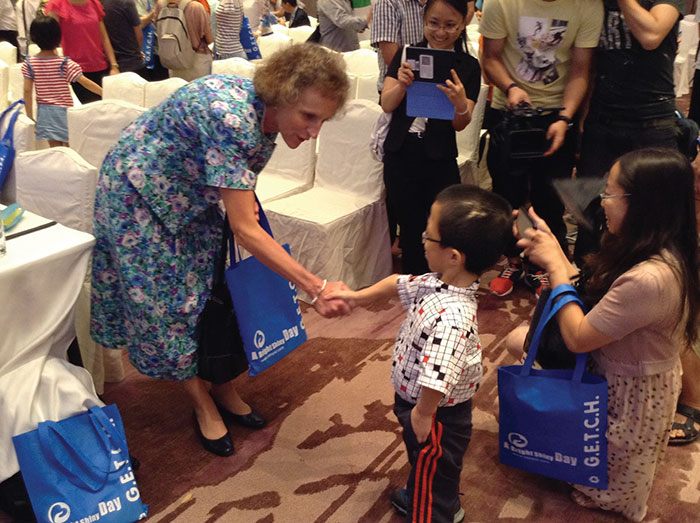
CG Galt greets a participant in the 20th anniversary celebration of the Guangzhou English Training Center for the Handicapped, a school that provides disabled students with higher education and English-language skills to prepare them for employment after graduation. Thao Anh is nearby capturing images on an iPad for CG Galt’s microblog.
Public Affairs Section / U.S. Consulate General Guangzhou
Tips for Successful Diversity-Focused Partnerships
Given the many different personalities in the Foreign Service, each mentor-mentee partnership will likely require a different prescription for success. Interactions within partnerships can help mentors identify talented colleagues from different backgrounds who could benefit from guidance on tackling professional challenges throughout their careers. As mentors, senior managers gain a better understanding of the talents that exist within the Foreign Service and can deploy human resources in ways that benefit the whole organization. Mentees can learn from watching their mentors in action and, later, emulate their best qualities and behaviors. When senior managers serving as mentors demonstrate respect for diversity, more junior employees, especially minorities from underrepresented populations, will be inspired to stay in for a career.
Our own mentor-mentee relationship is both unique and illustrative. We were fortunate to serve together at Consulate General Guangzhou, and to have reaped immediate rewards from our partnership. Thao Anh’s out-rotation to the front office led to her heightened interest in public diplomacy outreach. She had the opportunity to observe Consul General Galt interact with her Chinese counterparts and the Chinese public. CG Galt’s encouragement to Thao Anh led to their joint cooperation on several social media projects, including creation of the “Voice of the CG” position, whereby first- and second-tour officers have the opportunity to draft microblog posts for the CG’s hashtag. Another example was creation of an interactive map on the consulate website where Chinese netizens can track the CG’s travel and public events. Throughout our collaboration, CG Galt benefited enormously from Thao Anh’s expertise in social media, which helped strengthen her outreach to diverse audiences. For Thao Anh’s part, as a political-coned officer, she was inspired by watching CG Galt in action and plans to bid on public diplomacy positions in the future.
Over the course of two years, we formed a strong partnership that has stood the test of time and geography. Our experience also provided us with insights on how the department can leverage its mentoring program to promote a more diverse and inclusive Foreign Service. Here are our tips for other mentoring partners.
• True Partnerships. Successful mentor-mentee pairings are true partnerships that benefit both parties. While the mentor is clearly the more experienced, this should not preclude her or him from also learning from the mentee. A true partnership means understanding the diversity that each brings to the relationship. The key is respect for that diversity and the desire to see it carry through to the highest ranks of the Foreign Service.
Communication. Regular and focused communication is essential for an effective and enduring partnership. Mentees should initiate contact with their mentors and come to every meeting with prepared agendas. We encourage mentees to articulate their expectations.
Locally employed and Civil Service colleagues can also be fantastic mentors, lending their cultural and institutional knowledge.
Being able to effectively manage partnerships with mentors is a great way to learn to be proactive in personal and professional development. Mentees also have the opportunity to learn how to “manage up,” a valuable Foreign Service skill. Meanwhile, mentors should demonstrate interest and commitment by gauging their mentees’ needs and always responding to communications in a timely manner.
Motivation and expectations. Mentees should enter partnerships with the appropriate motivation, while mentors should continually challenge their mentees to pursue opportunities that are advantageous for their long-term career prospects. Mentees should not assume mentors are obligated to help them secure future assignments. Instead, mentees should strive to build a foundation of mutual trust and understanding with their mentors. Through regular interaction over time, mentees will learn skills to enhance their competitiveness in the bidding process. Meanwhile, mentors should be prepared to assume multiple roles, including serving as a sounding board and providing accolades and support at certain times.
Learning and growing equally. Both parties should actively participate in learning and growing together. Mentees will feel more invested in ensuring a successful partnership if they are given the opportunity to contribute as equal partners and to reciprocate their mentors’ contributions over time.
Sharing experiences and constructive feedback. Mentors should strive to encourage their mentees to share their previous experiences and perspectives, and both should be prepared to provide each other positive and constructive feedback. Mentors can help entry-level employees learn the unwritten rules of the Foreign Service, while mentees can provide valuable input as new employees of the department. Mentees are frequently able to provide expertise in areas where their mentors may lack familiarity.
Networking. Among the many benefits for mentees is the ability to tap into their mentors’ networks of information and influence. Mentees also will learn to develop mutual trust and interact with authenticity—both characteristics that can aid diplomats in their daily work. Since mentors are not usually in one’s chain of command, mentees can freely share concerns without regard to position or EER. Mentoring partnerships offer ELOs a chance to learn to work comfortably with more senior managers.
Confidentiality. While mentor-mentee partnerships are not exclusive, any information shared should remain confidential to enhance the openness and strength of the relationship. Mentors should not disclose information in their mentees’ EERs without their prior consent. Mentees should keep private conversations with their mentors truly private.
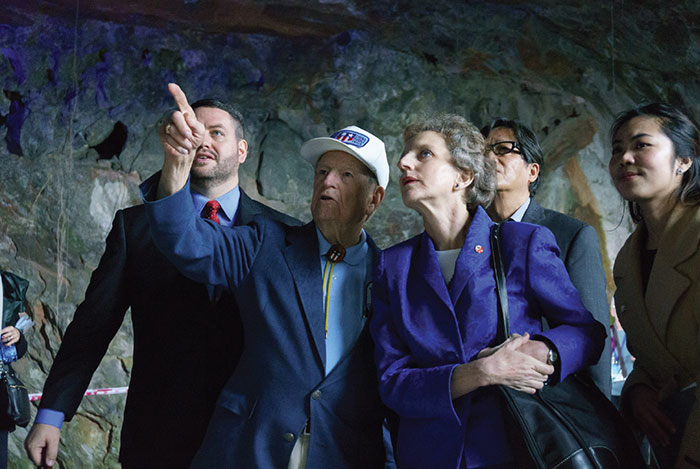
CG Galt listens to Jay Vinyard, a 91-year-old U.S. veteran Hump pilot, describe his experiences in World War II as part of the opening ceremony of the Flying Tigers Heritage Park in Guilin, Guangxi Zhuang Autonomous Region, on March 28.
Public Affairs Section / U.S. Consulate General Guangzhou
• Multiple Partnerships. Having access to multiple mentors will enable mentees to receive different types of support. We recognize that mentors and mentees will not always live in the same city, and that relationships may evolve over time. For this reason, we recommend that mentees be proactive in seeking out multiple mentors—including a mentor whose personal background, age, gender, race and professional experience differs significantly from their own. In fact, partnerships with great differences between the mentee and mentor offer the greatest learning potential for both parties given the different insights they can provide each other.
• Diverse Partnerships. Employees should seek to form partnerships with colleagues who share a commitment to diversity and professional development. We urge mentors to seek out mentees who do not share their backgrounds or career paths or mentees who have less experience and might benefit from the mentors’ guidance. We encourage mentees to seek out senior colleagues from whom they could learn. A mentor’s background is less important than his or her willingness to provide assistance and an unwavering commitment to the mentee's short- and long-term career goals. Locally employed and Civil Service colleagues can also be fantastic mentors, lending their cultural and institutional knowledge.
• Virtual Partnerships. Given our mobility as Foreign Service members, virtual mentoring enables mentors and mentees to take advantage of today’s technological tools to conquer geography and time zones to maintain long-term partnerships. While open and honest communication is necessary for in-person mentoring, it is an absolute prerequisite for a successful online mentoring partnership. Both mentor and mentee must redouble commitments to be responsive to one another. While we recommend face-to-face interactions whenever possible, electronic communication can offer some advantages. Mentees may be less conscious of their mentors’ rank or position and be more forthright in their exchanges.
Let the Partnerships Begin!
A diplomatic corps that is diverse in gender, race, sexual orientation, national origin, physical ability, and personal and professional background, including the Senior Foreign Service, will help ensure that our Service truly reflects our nation’s diversity. It will also ensure that the State Department has the benefit of diverse perspectives and insights in foreign policymaking.
We encourage all officers and specialists to get involved as mentors and mentees. This is a collective effort that demands commitment from all of us. Let’s work together to achieve and sustain diversity across the Foreign Service ranks.
Read More...
- By the Numbers: Demystifying 2014 FS Promotion Statistics (State Magazine, April 2015)
- Bridging the Foreign Service Generational Gulf (The Foreign Service Journal, Oct. 2012)
- EW@S: Supporting and Mentoring Female Leaders (The Foreign Service Journal, May 2013)
- FAQs: Is there a mentoring process? (U.S. Department of State)
- The Thomas R. Pickering Foreign Affairs Fellowship (The Woodrow Wilson National Fellowship Foundation)
- The Charles B. Rangel International Affairs Program (Ralph J. Bunche International Affairs Program)

